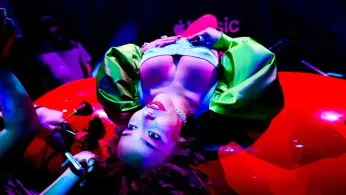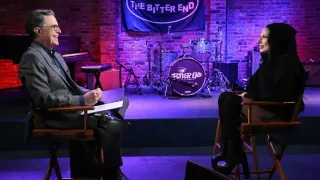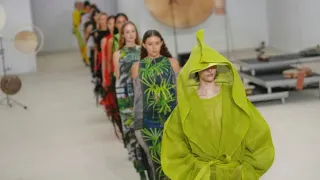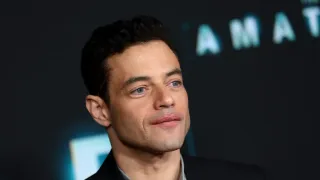
4 hours ago
Doja Cat Champions Bisexual Inclusion and Blasts Biphobia in New Interview
READ TIME: 4 MIN.
In a media landscape where LGBTQ+ representation is often siloed or tokenized, Doja Cat has emerged as a prominent mainstream artist using her platform to challenge stereotypes and promote acceptance. Her latest statements, made during the rollout of her fifth studio album ‘Vie,’ have sparked conversation about bisexuality, masculinity, and the enduring stigma faced by bisexual men—a group frequently marginalized even within LGBTQ+ communities .
Speaking to Interview magazine at her album release party, Doja Cat was unequivocal: “I love a bisexual man. If my man is a little femme, I have no problem with that. I just think there needs to be a balance and I need to connect with them in a certain spiritual whatever way” . The pop star elaborated that she often ignores what others might consider “red flags” in men—specifically, behaviors or traits perceived as “a little bit gay”—because she finds them appealing rather than problematic. This perspective is a direct rebuttal to the biphobia and homophobia that can permeate dating culture, even among those who identify as allies.
Doja Cat’s advocacy is not limited to interviews. Her new single “Stranger,” from the ‘80s-inspired album ‘Vie,’ features lyrics that celebrate attraction to men who “don’t look like he like dick / But if he liked it, I’d still like him,” playfully embracing the fluidity of sexuality and desire . The accompanying music video, released just before her co-hosting stint on The Tonight Show Starring Jimmy Fallon, showcases Doja in a variety of wedding dresses, visually underscoring her message of love beyond traditional norms .
During her appearance on Fallon’s show, Doja Cat participated in segments that highlighted her playful, inclusive persona, further amplifying her advocacy to a mainstream audience . Her willingness to discuss her preferences openly—both in lyrics and conversation—marks a significant moment in pop culture, where bisexual men’s identities are often erased or ridiculed.
Biphobia—prejudice against bisexual people—remains a pervasive issue, with bisexual men facing particular stigma related to masculinity, fidelity, and HIV risk, despite research showing these stereotypes are unfounded . Doja Cat’s comments come at a time when bisexual visibility is increasing but still lags behind that of gay and lesbian peers. Her advocacy is notable not only for its rarity among cisgender heterosexual women in the music industry but also for its potential to shift public perceptions.
In her Interview magazine feature, Doja Cat framed her attraction as part of a broader philosophy of “unconditional love,” urging listeners to move past “programmed” biases that limit romantic and sexual possibilities . This stance aligns with growing calls within LGBTQ+ advocacy circles for more nuanced, affirmative representations of bisexuality in media and popular culture.
LGBTQ+ advocates have praised Doja Cat for using her platform to confront biphobia and promote inclusivity. Her comments resonate with bisexual men and queer people who have long dealt with invisibility and stereotype-driven discrimination. By normalizing attraction to bisexual men, Doja Cat is helping to challenge the double standards that often penalize men for expressing same-sex desire while celebrating similar fluidity in women.
“It’s refreshing to see a mainstream artist not just tolerate but celebrate bisexual men,” said one LGBTQ+ advocate, who asked not to be named for professional reasons. “This kind of visibility can have a real impact on how society views bisexual people, especially men, who are so often left out of the conversation.”
The ‘Vie’ era represents a cohesive artistic vision for Doja Cat, both sonically and thematically. In her Interview magazine conversation, she described the album as a “powerhouse pop and R&B confection dedicated to the joys of sex, love, and dancing 'til you drop,” with a strong ‘80s aesthetic that informs both her music and fashion choices . This era follows previous albums that explored futuristic and darker alter egos, but ‘Vie’ is distinguished by its focus on romance, self-acceptance, and authenticity.
Doja Cat’s embrace of her “weirdness” and her candid discussion of therapy and personal growth in other recent interviews further contextualize her current messaging around love and identity . She has framed her journey as one of embracing all parts of herself—including her desires and quirks—and encouraging others to do the same.
Doja Cat’s advocacy for bisexual inclusion arrives as conversations about LGBTQ+ rights and representation continue to evolve. While progress has been made in some areas, bisexual men remain underrepresented and misunderstood in media and public discourse. By centering their experiences in her art and public statements, Doja Cat is contributing to a broader cultural shift toward greater acceptance and understanding.
Her message is clear: love should not be constrained by outdated norms or societal biases. As she continues to promote ‘Vie’ and engage with fans and media, Doja Cat’s voice adds a vital, affirming perspective to the ongoing dialogue about LGBTQ+ inclusivity in entertainment and beyond.
Throughout her recent media appearances, Doja Cat has used language that is affirming of all LGBTQ+ identities, avoiding stereotypes and generalizations. Her approach exemplifies how public figures can leverage their influence to foster a more inclusive culture, one where bisexual men—and all queer people—feel seen, valued, and desired.






